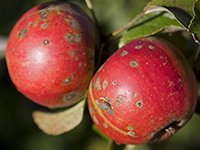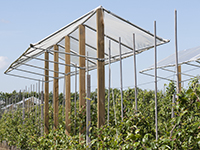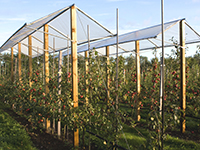PROTECFRUIT
PROTECFRUIT
- Protected production of organic apples and pears
The purpose of the project is to increase the yield and area with organic apples/pears by new technologies, to create new business opportunities for technical equipment, to reduce use of resources as well as easier access to organic fruit produced with respect for the principles of organic farming. The yield in organic apple and pear orchards is less than of third of the conventional due to pests, diseases and smaller fruit, despite frequent sprays with ‘natural' pesticides. In order to reduce spraying and increase the yield, protection of the trees by rain roofs has shown promising effects on fungal diseases. However, the microclimate under the rain roofs is altered and affects plant growth and quality. A novel technique is sprinkler spraying, where sprinklers are positioned at different heights in the tree row. Sprinklers may allow successful disease control with few curative potassium bicarbonate sprays instead of several preventive sulphur sprays. Sprinklers can also be used for release of scab ascospores by strategic irrigation in dry weather.
Pests like the rosy apple aphid and pear gall midge reduce fruit yields considerably. Flower strips as a source of natural enemies to control the rosy apple aphid, and biological control of gall midge larvae by new formulations of entomopathogenic fungi will be studied. The effect of postharvest hot water treatment and
monochrome light on wax and secondary metabolites will be studied to minimise waste during storage. Results from the project will be shared with the hort-industry by the advisory service.
Project period: 01-01-2014 to 31-12-2017
The purpose of the project is to increase the yield and area with organic apples/pears by new technologies, to create new business opportunities for technical equipment, to reduce use of resources as well as easier access to organic fruit produced with respect for the principles of organic farming. The yield in organic apple and pear orchards is less than of third of the conventional due to pests, diseases and smaller fruit, despite frequent sprays with ‘natural' pesticides. In order to reduce spraying and increase the yield, protection of the trees by rain roofs has shown promising effects on fungal diseases. However, the microclimate under the rain roofs is altered and affects plant growth and quality. A novel technique is sprinkler spraying, where sprinklers are positioned at different heights in the tree row. Sprinklers may allow successful disease control with few curative potassium bicarbonate sprays instead of several preventive sulphur sprays. Sprinklers can also be used for release of scab ascospores by strategic irrigation in dry weather.
Pests like the rosy apple aphid and pear gall midge reduce fruit yields considerably. Flower strips as a source of natural enemies to control the rosy apple aphid, and biological control of gall midge larvae by new formulations of entomopathogenic fungi will be studied. The effect of postharvest hot water treatment and
monochrome light on wax and secondary metabolites will be studied to minimise waste during storage. Results from the project will be shared with the hort-industry by the advisory service.
Project period: 01-01-2014 to 31-12-2017
Project leader

Karen Koefoed Petersen
AU Årslev
Phone and mail:
+45 8715 8336
karenk.petersen@food.au.dk
Project leader

Karen Koefoed Petersen
AU Årslev
Phone and mail:
+45 8715 8336
karenk.petersen@food.au.dk
Photos from the project



Photo: PROTECFRUIT